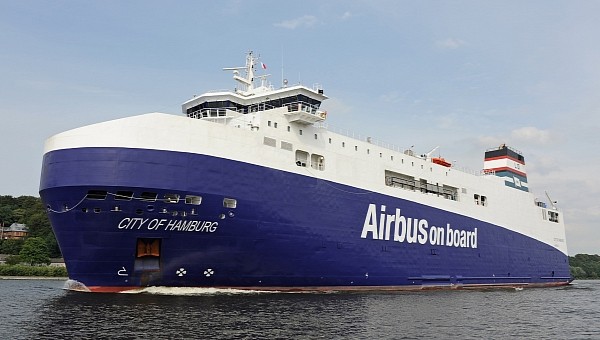Aviation and maritime transportation have one (negative) thing in common – they are both unanimously considered the most difficult mobility sectors to decarbonize. The transportation of aircraft components is where they intersect when it comes to the responsibility of emitting fewer harmful emissions. This is what Airbus is working on at the moment.
One of the global aviation giants, Airbus has put its unmatched capabilities to good use in relation to the net-zero carbon goal. In addition to being involved in research related to brand-new all-electric or hydrogen-fueled aircraft, it’s also giving adequate attention to what is believed to be the best solution we’ve got right now for aviation and shipping – sustainable fuel.
At the end of last year, Airbus launched a partnership with a green fuel producer that claims to have the largest production capacity in the world. Neste estimated that its capacity will grow to 5.5 million tons per year, starting this year. That would be an important achievement for the aviation industry itself, because SAF (sustainable aviation fuel) is still hard to come by, and expensive, which seriously slows down efforts to achieve green flights.
Neste’s SAF is mostly associated with commercial aviation successes, such as the first SAF-powered flight completed by an airliner with passengers on board. Airbus itself has started using it to feed the enormous Beluga cargo aircraft, since 2019.
But now it also wants to gradually introduce alternative fuels for the transportation of its aircraft. It already took some steps in this direction over the past years, by switching to biogas for the trucks that carry aircraft sections on European roads.
Over the next year and a half, this will be extended to maritime transportation. At the end of last year, Airbus launched a campaign that will test the use of SAF (also provided by Neste) for its fleet of cargo ships.
The first one to take a sip of green fuel will be Ciudad de Cadiz, a vessel that transports aircraft components from the A320 family from one European production site to another. It’s operated by Louis Dreyfus Armateurs and travels on a Saint-Nazaire-Tunis-Naples-Saint-Nazaire route.
For the purpose of this testing campaign, Ciudad de Cadiz will be fueled with SAF. Not totally, but for about one third, while the rest will be covered by conventional maritime fuel. Even this seemingly modest change is expected to cut CO2 emissions by 20% for each trip. This would lead up to 6,000 tons of CO2 being prevented from reaching the atmosphere, in one year, on this particular route.
At the same time, Airbus is also testing other ways of reducing emissions for the vessels that carry aircraft components, such as the revolutionary Seawing by Airseas.
At the end of last year, Airbus launched a partnership with a green fuel producer that claims to have the largest production capacity in the world. Neste estimated that its capacity will grow to 5.5 million tons per year, starting this year. That would be an important achievement for the aviation industry itself, because SAF (sustainable aviation fuel) is still hard to come by, and expensive, which seriously slows down efforts to achieve green flights.
Neste’s SAF is mostly associated with commercial aviation successes, such as the first SAF-powered flight completed by an airliner with passengers on board. Airbus itself has started using it to feed the enormous Beluga cargo aircraft, since 2019.
But now it also wants to gradually introduce alternative fuels for the transportation of its aircraft. It already took some steps in this direction over the past years, by switching to biogas for the trucks that carry aircraft sections on European roads.
Over the next year and a half, this will be extended to maritime transportation. At the end of last year, Airbus launched a campaign that will test the use of SAF (also provided by Neste) for its fleet of cargo ships.
The first one to take a sip of green fuel will be Ciudad de Cadiz, a vessel that transports aircraft components from the A320 family from one European production site to another. It’s operated by Louis Dreyfus Armateurs and travels on a Saint-Nazaire-Tunis-Naples-Saint-Nazaire route.
For the purpose of this testing campaign, Ciudad de Cadiz will be fueled with SAF. Not totally, but for about one third, while the rest will be covered by conventional maritime fuel. Even this seemingly modest change is expected to cut CO2 emissions by 20% for each trip. This would lead up to 6,000 tons of CO2 being prevented from reaching the atmosphere, in one year, on this particular route.
At the same time, Airbus is also testing other ways of reducing emissions for the vessels that carry aircraft components, such as the revolutionary Seawing by Airseas.






